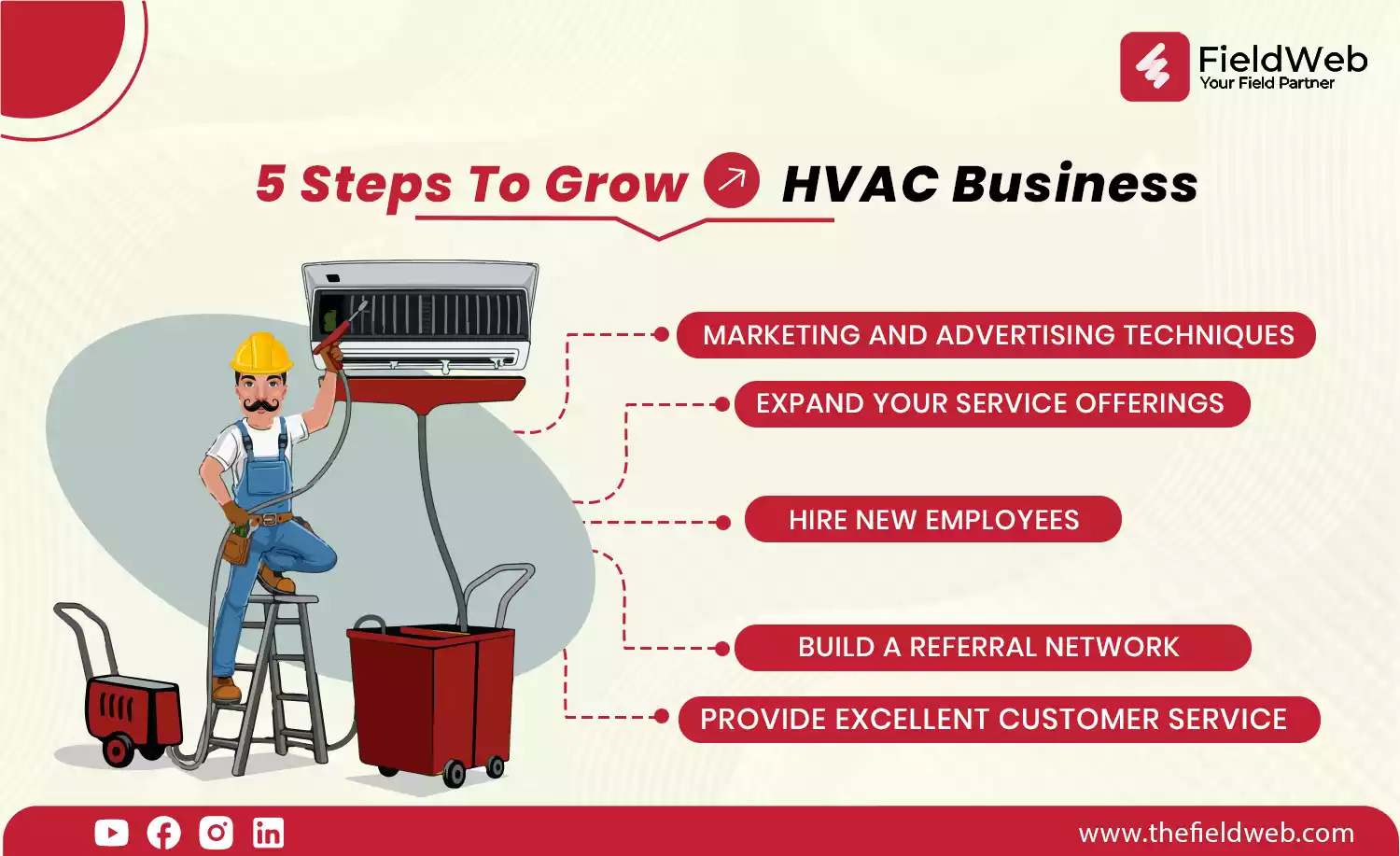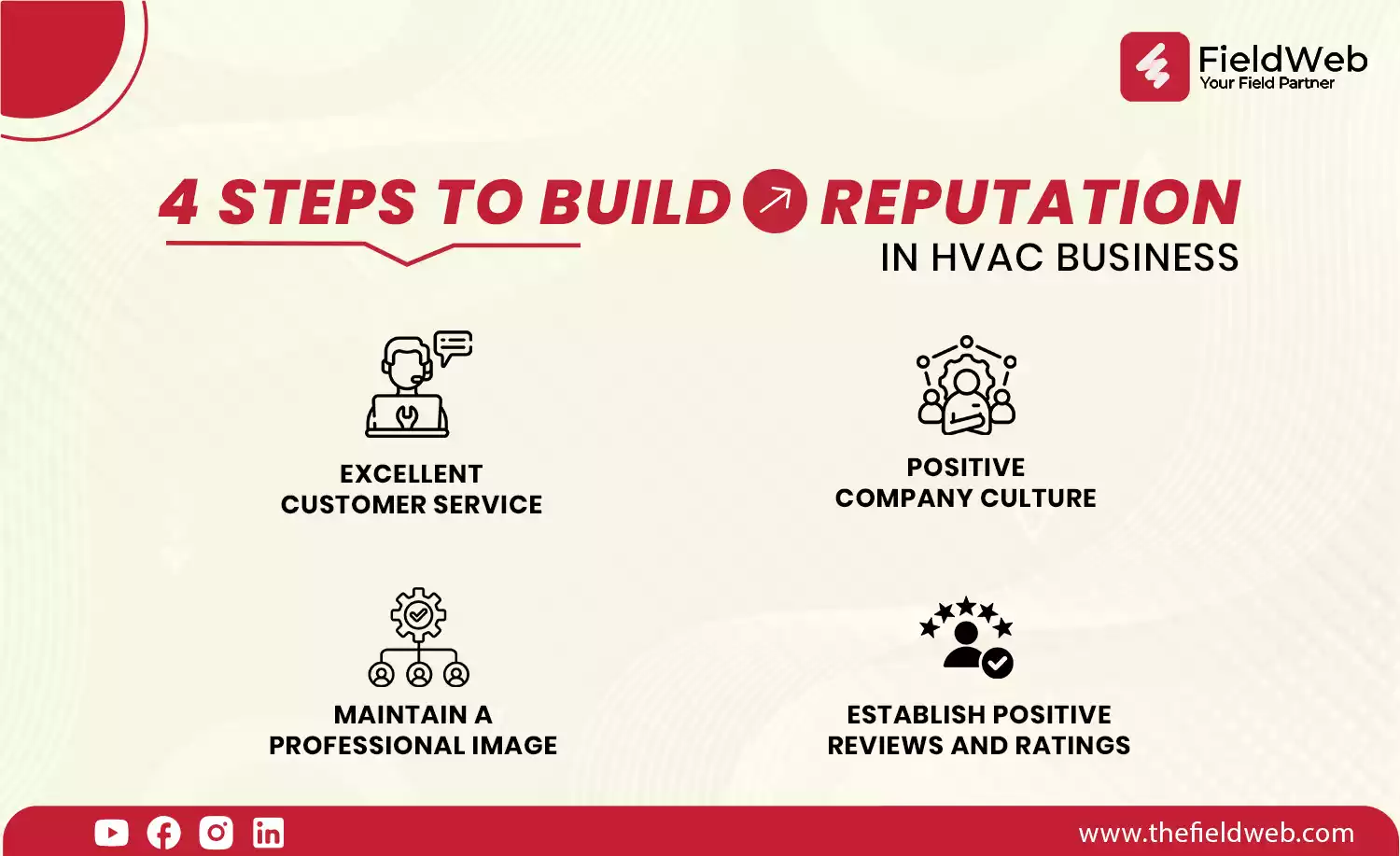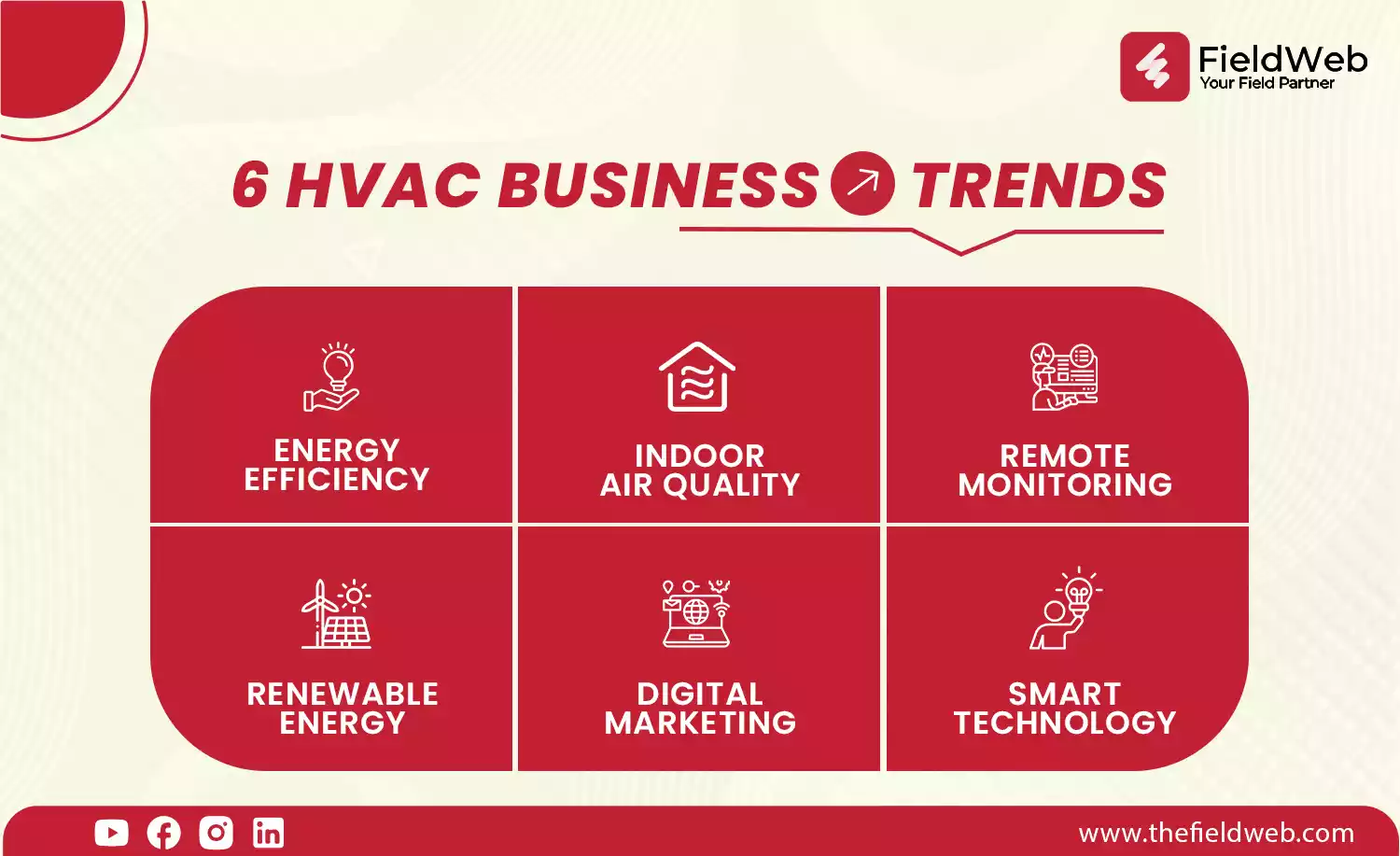FieldWeb Blog.
Get the knowledge and inspiration you need to run your home and commercial service business better.

Starting an HVAC company is no easy task. To be successful, you must put in a lot of effort, dedication, and planning. In this blog, we'll look at some strategies and tools for growing your HVAC business and staying ahead of the competition.
Starting your own HVAC company can be an exciting and rewarding endeavour, but it is not without its challenges. To be successful in the competitive HVAC industry, you must have a solid business plan, a thorough understanding of the market and its trends, and the ability to adapt to changing customer needs.
There are numerous factors to consider when launching your own HVAC business, whether you are a seasoned HVAC professional looking to start your own business or a newcomer to the industry. In this blog post, we'll look at some crucial steps you can take to launch your HVAC company and position it for success.

1. Create a Powerful Online Presence: A good business plan will serve as a road map for your company and keep you on track. Your business plan should include a mission statement for your company, a marketing plan, a financial plan, and a detailed description of the products and services you'll provide.
2. Acquire Financing and Funding: Because starting an HVAC business can be costly, you'll need to secure financing and funding. This can come from a variety of sources, including bank or Small Business Administration (SBA) loans, crowdfunding, or venture capital.
3. Obtain Necessary Licences and Permits: A good business plan will serve as a road map for your company and keep you on track. Your business plan should include a mission statement for your company, a marketing plan, a financial plan, and a detailed description of the products and services you'll provide.
4. Build a Team of Employees: Starting an HVAC company is a lot of work, so you'll need to assemble a team of employees you can rely on to get the job done. HVAC technicians, administrative personnel, and marketing personnel may be included.
Once your HVAC business is up and running, it's time to start growing it. Here are some key strategies you can use:

Building a strong reputation is essential to the success of any business. Here are some ways to establish a positive reputation in the HVAC industry:

1. Provide Excellent Customer Service: By being responsive, dependable, and respectful, you can provide excellent customer service. Respond to customer concerns as soon as possible and go above and beyond to exceed their expectations.For example, if a customer has an emergency HVAC problem, respond quickly and offer solutions to resolve the issue as soon as possible.
2. Foster a Positive Company Culture: Developing a positive company culture is critical to establishing a solid reputation. This includes treating your employees with dignity, providing opportunities for training and development, and creating a workplace where everyone feels valued and supported.
3. Maintain a Professional Image: Maintain a professional image by dressing professionally, using branded vehicles and uniforms, and speaking and acting professionally.For example, if you have a fleet of branded vehicles, make sure they are clean and well-maintained, and that your company logo and contact information are prominently displayed.
4. Establish Positive Reviews and Ratings: Encourage customers to leave feedback on online platforms such as Yelp and Google to establish positive reviews and ratings. Respond to negative reviews professionally and try to resolve any issues to the satisfaction of the customer.For example, if a customer leaves a positive review, thank them and ask permission to use their feedback in your marketing materials.
The HVAC industry is constantly evolving, and there are both challenges and opportunities to be aware of.Here are some of the key trends shaping the industry:

As the HVAC industry evolves, it is essential to stay up-to-date with the latest trends and technologies. Here are some HVAC business trends to watch in the coming years:

1. Energy Efficiency: Customers are becoming more concerned with energy efficiency, and HVAC companies must adapt. Expect increased demand for energy-efficient HVAC software that reduce energy consumption and lower utility bills in the coming years.HVAC companies, for example, can provide smart thermostats and zoning systems that allow customers to control the temperature in individual rooms while reducing energy waste.
2. Indoor Air Quality: With rising concerns about indoor air quality, HVAC companies can provide services to assist customers in improving the air they breathe. This includes cleaning the air ducts, purifying the air, and controlling the humidity. HVAC companies, for example, can install air filtration systems that remove allergens and other pollutants from the air, thereby improving indoor air quality and lowering health risks.
3. Remote Monitoring: Remote monitoring technology enables HVAC companies to remotely monitor and diagnose HVAC systems, reducing the need for on-site visits and increasing response times.For instance, HVAC companies can use sensors and other IoT devices to monitor HVAC systems in real-time and identify potential issues before they become major issues.
4. Renewable Energy: With the growing popularity of renewable energy sources, HVAC companies can now provide services that include solar panels and geothermal systems.For example, HVAC companies can install rooftop solar panels to power HVAC systems and reduce energy costs for customers.
5. Digital Marketing: In the digital age, HVAC businesses need to have a strong online presence to reach customers effectively. Creating a website, social media profiles, and online reviews are all part of this.HVAC companies, for example, can reach customers and build their brand by utilising online marketing tools such as SEO, PPC, and content marketing.
6. Smart Technology Integration: Customers are increasingly interested in smart technology, which HVAC companies can incorporate into their solutions to provide a more convenient and personalised experience. Integrating HVAC systems with smart home devices such as voice assistants and mobile apps is one example. Staying on top of these HVAC business trends will help you position your company for success in the coming years.
To optimize your HVAC business and streamline your operations, you can embrace field service management (FSM) tools. Here are some ways FSM can benefit your HVAC business:

1. Scheduling and Dispatching: FSM software can assist you in more efficiently scheduling and dispatching your technicians. You can assign jobs based on location, availability, and skill level, ensuring that your technicians arrive on time and with all necessary equipment.For example, if you receive an emergency HVAC repair request, FSM software can quickly identify and dispatch the nearest available technician to the site.
2. Real-Time Communication: FSM software allows your office staff and field technicians to communicate in real time. This enables better collaboration and faster problem-solving, lowering the likelihood of errors and delays.For example, if a technician encounters an unexpected problem on the job, they can quickly contact the office for advice and assistance.
3. Work Order Management: FSM software can assist you in more efficiently managing work orders, from creation to completion. You can monitor progress, track the status of each job, and manage invoicing and payments.For example, using FSM software, you can automate work order creation and electronically send invoices and receipts to customers, reducing paperwork and administrative tasks.
4. Digital Documentation: Adopting digital documentation can assist HVAC businesses in streamlining administrative tasks, reducing paperwork, and improving record-keeping. HVAC companies can manage work orders, service agreements, and invoices more efficiently by utilising digital tools such as mobile apps and cloud storage.HVAC companies, for example, can use digital tools like FieldWeb FSM to create and manage digital work orders, automate billing and invoicing, and securely store customer information in the cloud.
5. Performance Analytics: HVAC companies can track their key performance indicators (KPIs) and gain insights into their business operations by embracing performance analytics. This includes examining metrics such as technician productivity, customer satisfaction, and service response times in order to identify areas for improvement and optimise operations. HVAC companies, for example, can use FSM software such as FieldWeb FSM to track KPIs in real-time, generate performance reports, and identify areas for improvement. HVAC companies can improve their overall performance by analysing data on customer complaints, technician performance, and other key metrics.
To summarise, the HVAC industry is constantly evolving, and HVAC businesses must stay current on the latest trends and technologies in order to remain competitive. There are numerous areas where HVAC businesses can differentiate themselves and attract more customers, ranging from energy efficiency and indoor air quality to remote monitoring and renewable energy. HVAC businesses must embrace these trends and adapt to changing market conditions as there is a growing demand for eco-friendly, cost-effective, and high-quality HVAC solutions.
Furthermore, implementing field service management tools such as FieldWeb FSM can assist HVAC businesses in streamlining their operations, improving customer satisfaction, and increasing their bottom line. HVAC companies can increase productivity, reduce errors, and provide a better customer experience by optimising scheduling and dispatching, improving real-time communication, and managing work orders more efficiently.
To summarise, the HVAC industry's future is bright, and HVAC businesses can position themselves for success in the coming years by keeping an eye on these trends and utilising FSM tools like FieldWeb FSM. HVAC companies can differentiate themselves from the competition and build a strong reputation for excellence by providing high-quality HVAC solutions that are energy-efficient, eco-friendly, and tailored to customer needs.